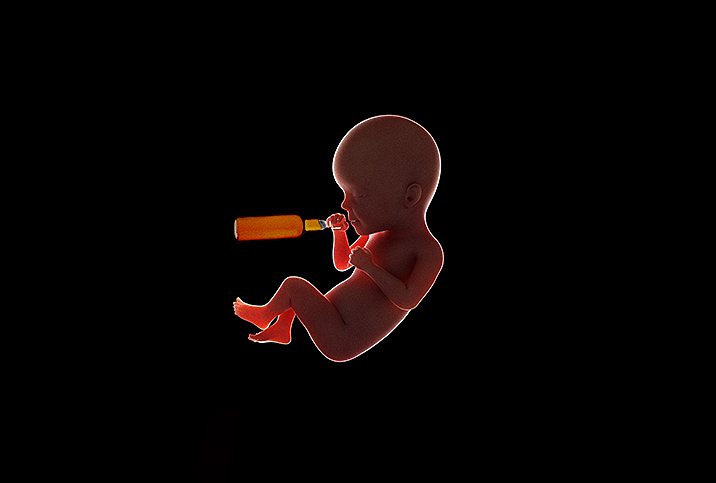Why Does Fetal Alcohol Spectrum Disorder Occur?

Fetal alcohol spectrum disorder (FASD) is entirely preventable. These conditions can affect children in different ways—with mild to severe repercussions. The physical, intellectual or behavioral problems will last a lifetime. The most severe and commonly known condition of FASD is Fetal Alcohol Syndrome (FAS).
Why is alcohol dangerous during pregnancy?
Alcohol affects pregnancy and possibly preconception. There is no safe time or amount to imbibe.
"Alcohol is damaging to babies' neurological and physical development. Babies cannot metabolize or eliminate alcohol as quickly as adults can. This creates a hostile environment for the baby's short-term and long-term development in utero," said James Miller, M.D., OB-GYN, with Monarch OBGYN in Wooster, Ohio.
Alcohol damages fetal development by inhibiting cell migration and disrupting growth, cellular differentiation and DNA or protein synthesis, stated Kecia Gaither, M.D., OB-GYN, director of perinatal services and maternal-fetal medicine at NYC Health + Hospitals/Lincoln in the Bronx.
"There is no established safe amount of alcohol use during pregnancy or in the preconceptual period," Gaither said.
Possible conditions of the fetal alcohol spectrum disorder
"Fetal alcohol syndrome represents a spectrum of congenital anomalies impacting the structural and neurological development of the fetus of a mother who drinks alcohol," said Gaither.
Children exposed to alcohol before birth can be diagnosed with several conditions, including:
- Fetal alcohol syndrome (FAS): This is the most severe form of the disorder. Babies tend to have facial features, nervous system problems, growth difficulties, mental disabilities or fetal death.
- Partial fetal alcohol syndrome (pFAS): Infants have slow growth, a couple of physical feature abnormalities and central nervous system problems.
- Alcohol-related birth defects (ARBD): Issues related to kidney, heart, bone, vision and hearing.
- Neurobehavioral Disorder Associated with Prenatal Alcohol Exposure (ND-PAE): Manifests with learning difficulties, intellectual disabilities and behavioral problems.
Why you shouldn’t drink during preconception and pregnancy
Women who are trying to conceive should stop drinking alcohol during preconception. Fetal alcohol spectrum disorder can occur during the first few days after conception, prior to confirmation of pregnancy.
Alcohol consumption by men before conception has been linked to congenital disabilities in several studies. A 2019 study published in JAMA Pediatrics suggested an increased risk of heart, gastrointestinal tract and limb defects due to sperm abnormalities caused by alcohol.
"All the structures in a human are developed during the first six weeks of pregnancy—often before the woman even knows she is pregnant,” Gaither said. “As such, if pregnancy is considered, it’s best not to drink alcohol in the preconceptual period,"
However, not all pregnancies are planned. If you receive a positive test result, stop drinking alcohol immediately. It is never too late to stop drinking. Speak with your physician, so your healthcare provider knows to watch for related symptoms.
What signs of FAS can a doctor see during pregnancy?
Diagnosis can be difficult due to the variety of symptoms. There is no diagnostic test. These disorders also have no cure but, through early diagnosis, it is possible to help a child lead a better life.
"During pregnancy, there are limited specific findings. The baby may be experiencing growth restriction and decreased head circumference," Miller said. "After delivery, findings such as smooth and small upper lip, flat nasal bridge, small openings of the eyes and a shorter distance between eyes."
Abnormalities such as cardiac defects, seizure disorders and hearing loss may occur, Miller indicated. Regarding behavioral disturbances, in the long term, "the child may be more irritable, hyperactive, inattentive, delayed social skills, memory deficits—along with being at risk for anxiety and depression."
Central nervous system problems, physical features and social difficulties may include:
Physical features
- Low body weight.
- Small eyes.
- Smooth skin surface between upper lip and nose.
- Short nose.
- Thin upper lip.
- Small head circumference.
- Deformities of joints.
Birth defects
- Vision difficulties.
- Bone problems.
- Hearing loss.
- Heart defects.
- Kidney problems.
Central nervous system and brain problems
- Intellectual disability.
- Poor coordination.
- Learning disabilities.
- Developmental delay.
- Balance problems.
- Poor memory.
- Difficulty in reasoning.
- Nervousness.
- Hyperactive behavior.
- Speech problems.
- Difficulty paying attention.
- Poor judgment skills.
- Sleeping difficulties in infants.
Social problems
- Poor social skills.
- Difficulties in school.
- Problems adapting to change.
- Information processing challenges.
- Difficulty planning.
- Problems with impulse control.
- Difficulty working on a purpose.
What you should know if your baby has a fetal alcohol spectrum disorder
"Close follow-up is required in a woman who drinks during pregnancy," Gaither said, adding several suggestions for ways to proceed during pregnancy and after childbirth:
- Echocardiographic evaluation: An evaluation of normal cardiac development is warranted during the fetal period, as alcohol can cause cardiac defects.
- Fetal growth: Growth may be affected. Special attention should be placed on cranial growth parameters, as small head/brain size may occur.
- Anatomical examination: "Assessment of an anatomical survey is additionally warranted to ensure other body parts such as limbs have developed normally," Gaither explained.
- Behavioral issues: After delivery, it is important to assess whether developmental milestones, both cognitive and physical, have been reached. Social and behavioral problems require evaluation.
Although there is no cure for fetal alcohol spectrum disorder, the child may benefit from special education programs, mental health follow-ups, speech therapy and treatments for depression, attention deficit hyperactivity disorder, sleep difficulties or behavioral problems.
How to prevent fetal alcohol spectrum disorder
"Overall, it’s about prevention and early support for families. Educating mothers on alcohol use in pregnancy and recognition of those that are using alcohol during pregnancy to prevent fetal alcohol syndrome," Miller said.
Key points to remember regarding pregnancy and alcohol:
- Alcohol is not a safe substance at any time during pregnancy.
- All types of alcohol are strongly discouraged.
- The sooner fetal alcohol spectrum disorder is diagnosed, the better.
- A stable and supportive home can increase the chances of healthier development for the child.
- If you are breastfeeding, alcohol can pass through breast milk.
- Women and men who are trying to conceive should avoid alcohol.
The bottom line
Drinking during conception or pregnancy can lead to a host of potential health conditions. Be honest about your behavior with your medical professional to help your doctor keep tabs on your baby’s progress and development. Save the alcohol for after delivery and, if breastfeeding, wait until your baby is weaned.


















